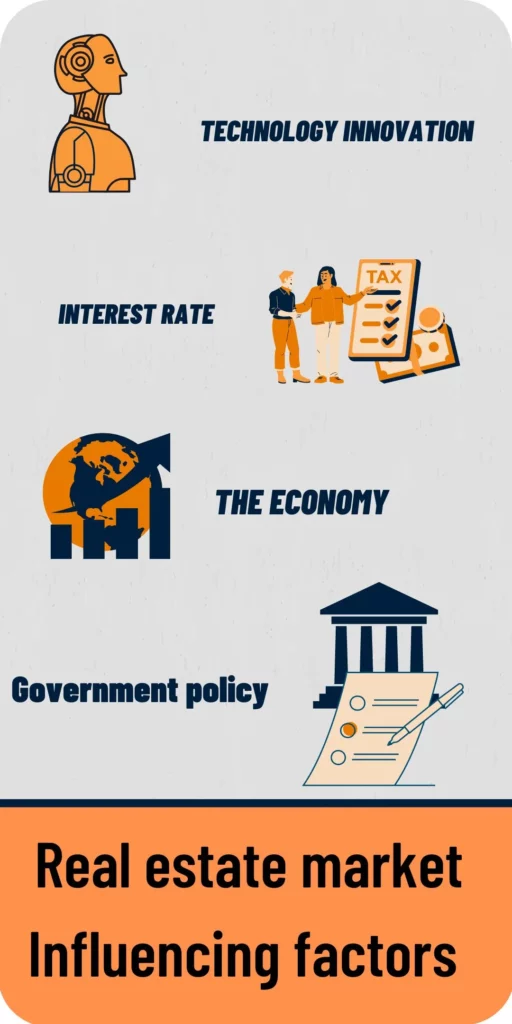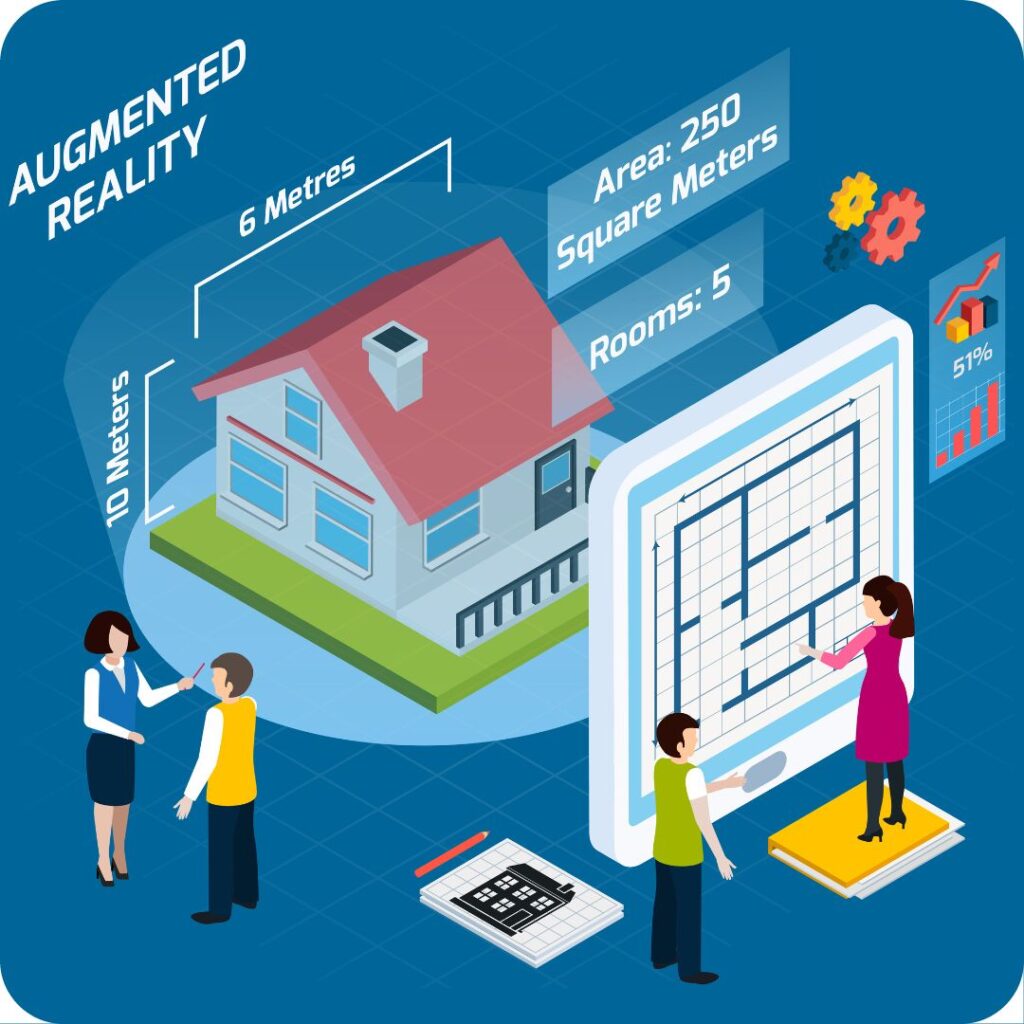Real estate market trends: How Technology is Disrupting the Traditional Industry in 2023
Real estate market trends refer to the changes and developments that occur in the housing industry over time. These trends can have a significant impact on buyers, sellers, and investors, as they can influence factors such as housing prices, demand for certain types of properties, and market conditions. Understanding real estate market trends is essential for anyone looking to enter the housing market, whether you’re a first-time homebuyer, an experienced investor, or a real estate professional. By staying up-to-date on the latest real estate market trends, you can make informed decisions and achieve your real estate goals.
Quick Jump List
Current state of the real estate market
The current state of the real estate market is largely characterized by strong demand and limited supply, which has driven housing prices up in many areas. This real estate market trends has been fueled in part by historically low-interest rates, which have made it more affordable for many people to borrow money to purchase homes. At the same time, a shortage of available housing has made it difficult for some buyers to find the right property and has contributed to bidding wars and rising prices.
The COVID-19 pandemic has also had an impact on the real estate market trends, with many people reevaluating their housing needs and preferences in light of the new realities of remote work, social distancing, and other factors. This has led to increased demand for homes with more space, access to outdoor areas, and home office setups.
Overall, the current state of the real estate market trends is characterized by a complex set of factors, including low-interest rates, limited supply, changing demographics, and lifestyle preferences, and the ongoing impact of the pandemic. As a result, it’s important to keep a close eye on real estate market trends and conditions in order to make informed decisions about buying, selling, or investing in real estate.
Factors that are influencing real estate market trends
Several factors are currently influencing real estate market trends.
Interest rates: Historically low-interest rates have made it more affordable for many people to borrow money to purchase homes, which has driven demand for housing and contributed to rising prices.
Inflation: Rising inflation can also impact the real estate market, as it can lead to higher housing prices and interest rates.
Demographic changes: Changes in demographics, such as the aging of the population or the rise of millennial homebuyers, can have a significant impact on the types of properties that are in demand and the overall health of the real estate market.
Lifestyle preferences: Changes in lifestyle preferences, such as a growing interest in eco-friendly homes or a desire for more outdoor space, can also impact the types of properties that are in demand and the overall health of the real estate market.
Technological innovations: The rise of new technologies, such as virtual reality tours and online homebuying platforms, is changing the way people buy and sell homes and is likely to have a significant impact on the real estate industry in the years to come.
Overall, these and other factors are shaping the current state of the real estate market and are likely to continue to influence real estate market trends in the future. Understanding these trends is essential for anyone looking to buy, sell, or invest in real estate.

demographic and lifestyle changes that are driving demand for certain types of properties
Demographic and lifestyle changes are also driving demand for certain types of properties.
Aging population: As the baby boomer generation ages, there is increasing demand for homes that are designed to accommodate people with mobility issues or other health concerns. These may include single-story homes or homes with features such as wheelchair ramps or wider doorways.
Millennial homebuyers: Millennials are now the largest generation in the workforce and are beginning to enter the housing market. This group tends to prioritize walkability, access to public transportation, and proximity to restaurants and other amenities. They may also be more likely to value sustainability and energy efficiency.
Remote work: The COVID-19 pandemic has led to a significant increase in remote work, and many people are now looking for homes with dedicated office spaces or other features that can support their work-from-home needs.
Outdoor space: The pandemic has also led to an increased interest in outdoor space, as people look for ways to socialize and stay active while maintaining social distancing. As a result, homes with yards, patios, or other outdoor amenities are in high demand.
Overall, understanding these demographic and lifestyle changes can help real estate professionals and buyers make more informed decisions about the types of properties that are likely to be in demand in the coming years.
impact of technological innovations on the real estate industry,
Technological innovations are rapidly transforming the real estate industry
Online homebuying platforms: Online homebuying platforms, such as Zillow and Redfin, have made it easier than ever for buyers to search for homes and connect with real estate agents. These platforms offer a wealth of information about homes for sale, including photos, virtual tours, and neighborhood data.
Virtual reality tours: Virtual reality tours allow buyers to explore homes from the comfort of their own computers. This technology can be especially useful for buyers who are relocating to a new area or who are unable to attend in-person home tours. In today’s fast-paced world, virtual tours are a convenient and efficient way for buyers to view properties and make informed decisions about their next home purchase
Predictive analytics: Predictive analytics are being used to help real estate professionals identify potential buyers and sellers and target marketing efforts more effectively. By analyzing data about past sales and other factors, predictive analytics can help real estate professionals predict future market trends and adjust their strategies accordingly.

Smart home technology: Smart home technology, including features such as smart thermostats, lighting, and security systems, is becoming increasingly common in homes. These features can make homes more attractive to buyers and can help sellers command higher prices.
Blockchain technology: Blockchain technology has the potential to transform the real estate industry by simplifying and streamlining the process of buying and selling homes. By creating a secure, decentralized system for recording and verifying property transactions, blockchain technology could help eliminate fraud and reduce the time and cost associated with closing real estate deals.
Regional trends in the real estate market
Overview of the real estate market trends in different regions of the country/world
The real estate market trends can vary significantly from region to region, both within a country and around the world. Here are a few examples of how the real estate market can differ in different regions:
United States: In the United States, the real estate market can vary widely from state to state and even from city to city. For example, in cities like San Francisco, New York, and Los Angeles, housing prices can be extremely high due to high demand and limited supply. In contrast, in more rural areas or cities with lower demand, housing prices may be much more affordable.
Europe: In Europe, there are also significant differences in the real estate market from country to country. For example, in cities like Paris and London, housing prices can be very high, while in other areas of Europe, such as parts of Spain or Portugal, housing prices may be much more affordable.
Asia: In Asia, countries like China and Japan have seen significant growth in their real estate markets in recent years. In China, for example, there has been a boom in housing construction and prices have been rising rapidly in many cities. In Japan, on the other hand, there has been a long period of stagnant or declining real estate prices.
Middle East: In the Middle East, these real estate market trends has been impacted by factors such as political instability, economic uncertainty, and changing demographics. For example, in Dubai, there was a period of rapid growth in the real estate market in the early 2000s, but this was followed by a significant downturn in the wake of the global financial crisis.
Emerging trends in the real estate market
include sustainability and green building, co-living and shared spaces, virtual and augmented reality, short-term rentals and the sharing economy, and adaptive reuse and mixed-use development. These real estate market trends are reshaping the industry, creating new opportunities for investors and developers, and responding to changing consumer preferences and technological advancements.
Emerging trends that are likely to shape the real estate market in the near future
Emerging trends likely to shape the real estate market in the near future include remote work and decentralized living, smart homes and IoT technology, the aging population and senior living, modular construction and 3D printing, and energy efficiency and net-zero homes. These trends are driven by changing consumer preferences and technological advancements and may create new opportunities for investors and developers while transforming the way homes and buildings are designed and constructed.
opportunities or challenges that these trends may present for buyers, sellers, or real estate investors
Emerging real estate market trends in the real estate market present both opportunities and challenges for buyers, sellers, and real estate investors. Opportunities include increased demand for specialized properties, reduced construction costs, and enhanced flexibility. Challenges include the cost of implementing new technologies, regulatory challenges, and economic uncertainty. Careful consideration and a deep understanding of the market are needed to make informed decisions.
Conclusion
In conclusion, the real estate market is constantly evolving, shaped by a range of factors such as macroeconomic trends, demographic changes, technological innovations, and emerging consumer preferences. While these real estate market trends present both opportunities and challenges for buyers, sellers, and real estate investors, it’s important to stay informed and up-to-date on the latest developments in order to make informed decisions. Whether you’re buying, selling, or investing in real estate, understanding the real estate market trends and how they may impact your goals is key to success. As the market continues to evolve, it will be important to stay adaptable and open to new opportunities in order to thrive in this dynamic industry.

[…] service, offering competitive pricing, and staying up-to-date with the latest technology and trends in real estate photography. By providing high-quality photos and exceptional service, you can establish yourself as a trusted […]